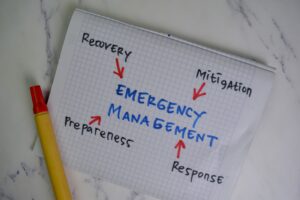If a disaster occurs, do you have a disaster emergency plan that protects important tax and financial information? Disasters can have an immediate and lasting impact on individuals, organizations, and businesses. Year-round preparation is critically important, and every individual and business should conduct an annual assessment of readiness. Currently, the Federal Emergency Management Agency (FEMA) has issued 25 major disaster declarations in 15 states impacted by winter storms, flooding, tornadoes, wildfires, landslides, and mudslides.
These are examples of disasters and emergencies that can affect taxpayers. For current disaster declarations and information on how declarations are made, see FEMA’s Current Disasters Page.
The IRS offers tips which may help taxpayers protect personal financial and tax information in their preparedness planning. 
Protect and Make Copies of Important Documents
Original documents such as tax returns, Social Security cards, marriage certificates, birth certificates and land ownership documents need to be secured in a waterproof container in a safe space. Taxpayers are encouraged to also make copies of these important documents and store them in a secondary location such as a safe deposit box or with a trusted person who lives in a different area. In addition, scanned documents can be stored on a flash drive for easy portability.
Keep a Record of Valuables
In this era of cell phone technology, it is highly recommended for taxpayers to use such devices to record high-value items. A simple list with current photos or videos may also help support claims for insurance or tax benefits after a disaster. The IRS disaster loss workbooks can help individuals and businesses make lists of belongings or business equipment.
Rebuilding Records
Reconstructing or replacing records after a disaster may be required for tax purposes, claiming federal assistance or insurance reimbursement. The more accurately the loss is estimated, the more loan and grant money there may be available. Taxpayers who have lost some or all their records during a disaster should visit IRS’s Reconstructing Records webpage as a first step.
Employers Should Check Fiduciary Bonds
Disasters can impact a business’ ability to make timely federal tax deposits. Employers using payroll service providers should check if the provider has a fiduciary bond in place that can protect the employer in the event of default by the payroll service provider. The IRS reminds employers to carefully choose their payroll service providers.
IRS Can Provide Tax Relief After a Disaster
After FEMA issues a major disaster or an emergency measures declaration, the IRS may postpone certain tax filing and payment deadlines for taxpayers who reside or have a business in certain counties affected by the disaster. The IRS provides details on states and counties that have been issued relief on the IRS disaster relief page.
Taxpayers in the affected areas do not need to call to request this relief. The IRS automatically identifies taxpayers located in the covered disaster area and applies filing and payment relief. Those impacted by a disaster can contact the IRS disaster hotline at 866-562-5227 to ask their tax-related questions of an IRS specialist trained to handle disaster-related issues.
Taxpayers who do not reside or have a business in a covered disaster area but suffered impact from a disaster should call 866-562-5227 to find out if they qualify for disaster tax relief and to discuss other available options.